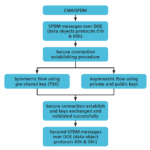In the early days of the PSS rollout, some verification engineers were suspicious. Just as they were beginning to get comfortable with UVM, here came yet another standard to add to their learning and complexity overhead. Then the fog started to clear; UVM is ideal for block-level testing whereas PSS is ideal for system level testing.… Read More
Heterogeneous 2D/3D Packaging Challenges
A growing trend in system design is the use of multiple ICs mounted in advanced packages, especially in high-performance computing and AI. These modern packages now integrate multiple ICs, often with high-bandwidth memory (HBM), resulting in hundreds of thousands of connections that need proper verification. Traditional… Read More
Averting Hacks of PCIe® Transport using CMA/SPDM and Advanced Cryptographic Techniques
In today’s digital landscape, data security has become an indispensable feature for any data transfer protocol, including Peripheral Component Interconnect Express (PCIe). With the rising frequency and sophistication of digital attacks, ensuring data integrity, confidentiality, and authenticity during PCIe transport… Read More
Reset Domain Crossing (RDC) Challenges
In the early days an IC had a single clock and a single reset signal, making it a simple matter to reset the chip into a known, stable state, so there was little need for detailed analysis. For modern designs there can be dozens to hundreds of clocks, creating separate domains and some use of asynchronous resets, so the challenge of ensuring… Read More
Electrical Rule Checking in PCB Tools
I’ve known about DRC (Design Rule Checking) for IC design, and the same approach can also be applied to PCB design. The continuous evolution of electronics has led to increasingly intricate PCB designs that require Electrical Rule Checking (ERC) to ensure that performance goals are met. This complexity poses several challenges… Read More
Innexis Product Suite: Driving Shift Left in IC Design and Systems Development
At the heart of the shift-left strategy is the goal of moving traditionally late-stage tasks—such as software development, validation, and optimization—earlier in the design process. This proactive approach allows teams to identify and resolve issues before they escalate, reducing costly rework and shortening the overall… Read More
Relationships with IP Vendors
An animated panel discussion Design Automation Conference in June offered up a view of the state of RISC-V and open-source functional verification and a wealth of good material for a three-part blog post series.
Parts One and Two covered a range of topics from microcontroller versus more general-purpose processor versus running… Read More
Handling Objections in UVM Code
You begin writing some UVM code and there are parts of the code that aren’t done yet, so you begin to use uvm_objection, guarding that code. Rich Edelman, a product engineer at Siemens doing verification debug and analysis, wrote a paper on this topic, which I just read. This blog covers the topic of objections and provides some different… Read More
Next Generation of Systems Design at Siemens
Electronic systems design is filled with a wide range of tools used across IC packaging design, multi-board systems, design creation, physical implementation, electro-mechanical co-design, simulation & analysis, and new product introduction. Siemens has been offering tools in this flow for many years now, so I was able… Read More
Signal Integrity Basics
PCB and package designers need to be concerned with Signal Integrity (SI) issues to deliver electronic systems that work reliably in the field. EDA vendors like Siemens have helped engineers with SI analysis using a simulator called HyperLynx, dating all the way back to 1992. Siemens even wrote a 56-page e-book recently, Signal… Read More











